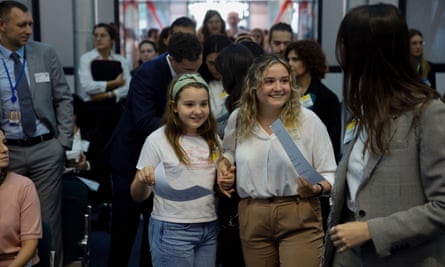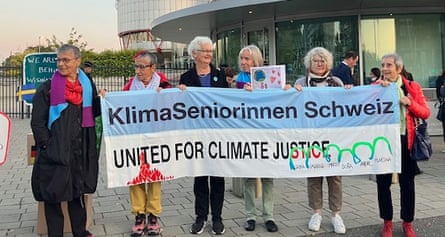An 11-year-old girl from Portugal sat inside the grand chamber of the European court of human rights on Wednesday to face 86 lawyers from 32 nations in the world’s largest climate legal action.
Mariana Agostinho was alongside her brother and sister, and her cousins, two rows back from 17 human rights judges.
A few feet away, teams of black-suited lawyers from across Europe stood to argue why the countries they represented should not do more to tackle global heating.
Agostinho had stood as the judges, led by the court’s president, Síofra O’Leary, filed in to take their seats. O’Leary told the packed courtroom: “The case is concerned with articles 2, 3, 18 and 14 [of the European convention on human rights] as regards the impact of climate change … which results in heatwaves and wildfires affecting the applicants’ lives and health.”
Outside the court, in Strasbourg, the six young people from Portugal were supported by campaigners from across the world, holding signs which read: “You are heroes, stay strong” and “Love and courage.”

One group of women from Switzerland had travelled to support the young people. They too had been in front of the human rights judges earlier this year demanding that their country takes more action to tackle global heating.
Rosmarie Wydler-Wälti, from Basel, clutched a painting in her hand. It had been sent to her by Agostinho when she heard about their case. “She painted it for me when she was eight. We are here to support them. We are elderly women who are suffering from climate change too and we are showing our support.”
Agostinho and her five fellow claimants say the European countries are breaching their human rights by failing to take adequate action to tackle global heating.
Aged between 11 and 24, they were driven to bring the case after the wildfires in the Leira region of Portugal in 2017, which killed 66 people. After a summer of more wildfires across Europe, they argue that the 32 nations’ policies are inadequate.
They argue that the failure of governments to act is in breach of their human rights: their right to life, their right to be free from inhuman or degrading treatment, their right to privacy and family life and their right to be free from discrimination. They are seeking a binding ruling from the judges to force the countries to rapidly escalate their emissions reductions.
Alison Macdonald KC, for the six young claimants, said: “This case is about the young. It is about the people that are paying the price for the failure of the states to tackle the climate emergency. It is about the harm that they will suffer during their lifetime unless states step up to their responsibilities.”

The nations had agreed to make a joint response. The UK spoke first to reject the claim, and argued on behalf of all the nations that it should be thrown out of the human rights court because it was beyond their jurisdiction.
Sudhanshu Swaroop KC, on behalf of the UK, said: “The states understand fully well the gravity of the fight against climate change.”
But he said that by bringing the case to the ECHR, national courts had lost the opportunity to give their views and national governments to form a consensus. “The applicants are seeking to impose wide-ranging obligations with profound social and economic consequences for the respondent states … there is no consensus amongst states and they have not debated this in their national parliaments.”
He argued that there were already international agreements under the Paris agreement and imposing another parallel regime on the countries risked undermining that.
But Macdonald said the countries’ responses were akin to saying the problem was just too big, too complicated, too global and the court should look away. “The respondents say that human rights have reached the end of the road. But they are wrong,” she said.
after newsletter promotion
She said the multilateral response to the climate crisis had materially affected the young people and they were entitled to bring their case against all the nations. Macdonald said the young people faced a future of unbearable heat, unless the nations took more action. Current policies mean the world was facing heating of 3C in their lifetimes.
Dunja Mijatović, the Council of Europe commissioner for human rights, told the court she was intervening in the case because of the effect of the climate crisis on young people.
“There is no doubt that climate change is a planetary threat to human rights and human existence,” she said. “Climate change has a devastating impact on human life for all of us, but in particular on children and young people. It will confine many children to a life of hardship. It is crucial that young people affected by climate change are heard and have access to justice … Time is of the essence; climate change is outpacing government action.”
The legal case is one of three which has been heard by the human rights judges this year. Wydler-Wälti and her fellow pensioners argued in March that their government’s “woefully inadequate” efforts to fight global heating violated their human rights. They say the inaction puts them at risk of dying during heatwaves.
In another case a French mayor, Damien Carême, took action against his government’s failure to tackle climate breakdown.
But the Portuguese case is the biggest of them all, drawing in 32 European countries and arguing that action has to be taken by all of them in order to properly tackle global heating.
Claudia Agostinho, 24, Mariana’s sister, said before the court case that she had felt fear during the fires in 2017 and still felt it.
Mariana still gets scared when she hears helicopters which remind her of the terrible fire. “I think it is amazing for Mariana to get involved in this case,” said Claudia. “But it is also very worrying. Why does she need to think about these things? She should be playing with her friends instead.”
O’Leary told the hearing that the judges would rule on all three climate cases at the same time. A decision is expected in several months.
The countries involved are the 27 members of the EU (Austria, Belgium, Bulgaria, Croatia, Cyprus, Czech Republic, Denmark, Estonia, Finland, France, Germany, Greece, Hungary, Ireland, Italy, Latvia, Lithuania, Luxembourg, Malta, the Netherlands, Poland, Portugal, Romania, Slovakia, Slovenia, Spain and Sweden) as well as Norway, Russia, Switzerland, the UK and Turkey.
